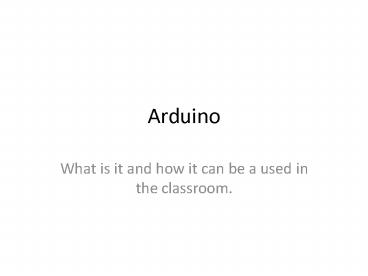Arduino - PowerPoint PPT Presentation
1 / 25
Title:
Arduino
Description:
What is an Arduino? Open source single board microprocessor. Designed to make electronics more accessible to non-engineers. Many models are available. – PowerPoint PPT presentation
Number of Views:3798
Avg rating:3.0/5.0
Title: Arduino
1
Arduino
- What is it and how it can be a used in the
classroom.
2
Last summer wind speed
- Arduino Wind Speed Data Logger
Peter Chinetti
3
What is an Arduino?
- Open source single board microprocessor.
- Designed to make electronics more accessible to
non-engineers.
Many models are available. This is an Arduino
Uno
Arduino Buying Guide
4
Arduino Uno Features
- Powered by USB or Power Jack
- Microcontroller ATmega328
- Operating Voltage 5V
- Input Voltage (recommended) 7-12V
- (limits) 6-20V
- 14 Digital I/O Pins (6 provide PWM output)
- 6 Analog Input Pins
- DC Current per I/O Pin 40 mA
- DC Current for 3.3V Pin 50 mA
- Flash Memory 32 KB (ATmega328), 0.5 KB used by
bootloader - SRAM 2 KB (ATmega328)
- EEPROM 1 KB (ATmega328)
- Clock Speed 16 MHz
5
Quarkstream Arduino in the Physics Classroom
- http//quarkstream.wordpress.com/
- "Arduino Cookbook" by Michael Margolis
- What teachers say
6
Field trip to see Dr. Heinrich Jaeger, Condensed
Matter Physicist, University of Chicago
7
Coffee Ground Robot Hand
- Video of robot hand in action...
8
3D printers are awesome!
9
Controlling an inexpensive 3D printer with an
Arduino
https//nano-cemms.illinois.edu/materials/3d_print
ing_full
10
Arduino and Photography
Timing is everything...
11
How can Arduino be useful in the Classroom?
- Students can easily
- read sensors and control actuators
- write programs to run on the Arduino board
- communicate between Arduino program and computer
programs (Processing, Labview). - control devices with larger power supplies
- communicate with the internet
12
Where can Arduino fit into curriculum
- Extensions to beginning Electronics
- Project for an technology class (EbD, Project
Lead the Way). - Activity in a (physical) programming class
- Student designed experiment in Physics
- Training for a robotics team
- Physics or Computer Club
13
Where to get an Arduino
- Arduino Uno 29.95
- Many internet sources
- Local and can pickup (Downers Grove)
- http//www.trossenrobotics.com/
- Good help and buying guide
- http//www.sparkfun.com/products/9950
- http//www.adafruit.com/
- but not at RadioShack or Tiger Direct
14
Optional Accessories
Electronic Brick Starter Kit 49.00
Parts list Arduino/Seeeduino sensor Chassis V1.1
X1 LCD 162 Characters X1 Rotary angle sensor
(Analog) X1 Big button switch X1 Buzzer X1 Tilt
switch X1 Lighting emitting diode X2 Light sensor
X1 Temperature sensor X1 2pin pluggable terminal
module X1 Fully buckled 3 wire cable X5 10 pin
colorful ribbon cable with 25 IDC connector X1
Use the helpfiles found at
http//www.trossenrobotics.com/store
15
Arduino Accessories
- Arduino playground - InterfacingWithHardware
sensorwiki.org
16
Getting Started with Arduino
- Download Arduino coding environment (SDK) to your
computer - http//arduino.cc/en/Guide
- http//arduino.cc/en/Main/Software
- 2. If have Electronic Brick Starter Kit
- Electronic bricks Cookbook VOL.1
- sample projects and code.
- Arduino cc website great examples
- www.arduino.cc/en/Tutorial/HomePage
17
More helpful websites
- http//www.ladyada.net/learn/arduino/
- http//www.adafruit.com/tutorials
- http//www.freeduino.org/
18
Book worth buying for newbies 9.99
Getting Started with Arduino
19
Dissect toys for inexpensive sensors and
actuators!
20
Great Examples on Arduino CC website
- http//www.arduino.cc/en/Tutorial/HomePage
Ratings on Arduino books, etcetera
http//www.arduinobooks.com/
21
Using shield to attach sensors
22
Same experiment using breadboard
23
Example of Code
- int Button 9
- int LED 8
- void setup()
- pinMode(LED,OUTPUT)
- pinMode(Button,INPUT)
- void loop()
- if (digitalRead(Button)) digitalWrite(LED,HIGH)
- else digitalWrite(LED,LOW)
Language Reference Guide
24
Physical Computing by Tom Igoe
- Book Description
- ISBN-10 159200346X ISBN-13 978-1592003464
Publication Date May 28, 2004 Edition 1st - Physical computing is all around us-from
interactive displays at museums to "puff sensors"
that aid the physically challenged. With a
multiple book buying audience, this book doesn't
require a specific background or technical
experience. It is designed to help make a more
interesting connection between the physical world
and the computer world. The audience size is
comparable to that of the Robot builder market.
In addition to this audience, physical computing
is also taught at several universities across the
US. This book is a great source of information
and knowledge for anyone interested in bridging
the gap between the physical and the virtual.
25
Making Things Talk by Tom Igoe
- Whether you need to plug some home sensors to the
Internet or create a device that can interact
wirelessly with other creations, this book shows
you exactly what you need. The projects in this
book are powerful yet inexpensive to build.
You'll become familiar with the Arduino open
source electronics prototyping platform, as well
as networking hardware such as Ethernet, Wi-Fi,
Zigbee, and Bluetooth. Get instructions for more
than two-dozen simple projects, and then
customize them with your own designs.































